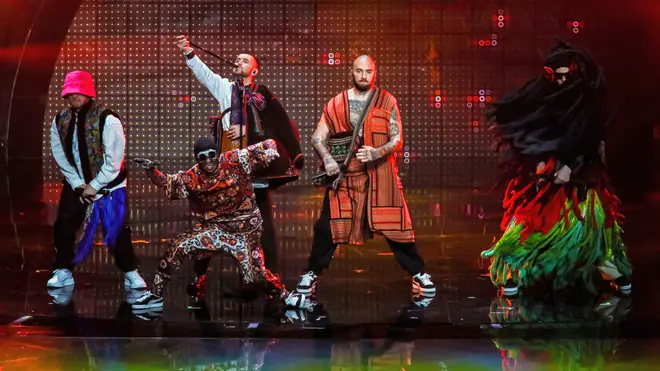Eurovision winner, Kalush Orchestra, brings traditional Ukrainian woodwind into the 21st century
16 May 2022, 10:45 | Updated: 16 May 2022, 10:55

Kalush Orchestra, Ukraine’s entry into the Eurovision Song Contest, took top honours at the annual music competition, and traditional woodwind offered some help along the way.
Listen to this article
On Saturday Ukrainian folk-rap group, Kalush Orchestra, were awarded first place at the Grand Final of the Eurovision Song Contest 2022 with their song, Stefania.
The song was written by Kalush Orchestra’s frontman, Oleg Psyuk, originally in dedication to his mother. However, the music has taken on a new meaning since the invasion of Ukraine by Russia began in late February 2022.
Ukrainians and other listeners around the world have interpreted the lyrics as Psyuk writing about his mother, the country of Ukraine.
With lyrics such as “I will always come to you on broken roads” and, “If I do not appreciate the care of the peak of glory, I am at a dead end”, it’s easy to see why this emotive libretto has struck a chord.
Stefania is currently the most listened to track out of this year’s song contest entries, and the upbeat track heavily features traditional Ukrainian woodwind instruments; the sopilka, and the telenka.
Read more: What is the Eurovision opening music and how long has ‘Te Deum’ featured in the song contest?

Kalush Orchestra - Stefania - LIVE - Ukraine 🇺🇦 - Grand Final - Eurovision 2022
Opening with close vocal harmonies, cementing the group’s roots in folk music, Psyuk enters after the short introduction with an upbeat rap verse.
A highlight of the tune are the ‘flute’-like melodies which feature heavily throughout the track, both as backing and solo.
Responsible for this sound is the sopilka, and the telenka, both played by multi-instrumentalist, Vitalii Duzhyk.
The Kalush Orchestra, formed in 2019, was originally a trio, but Duzhyk, along with two other backing singers, joined to create the six-member group who are representing Ukraine at the competition.
Due to military service rules, which currently requires all males aged 18 to 60 to stay in the country, the all-male group will be returning to Ukraine immediately after the competition to fight.
The group was granted a special temporary permit to leave Ukraine in order to compete in the competition. “This victory is for every Ukrainian,” they said after their win.

When not playing the sopilka in the background of Psyuk’s rap, Duzhyk also provides backing vocals during the chorus.
However, his shining moments come in the form of two solos where he plays the telenka with one hand, while holding a microphone to his lips to exaggerate the sound of the small woodwind instrument.
The repetitive woodwind hook ends the entire track with a 40-second solo, emphasising the traditional Ukrainian focus; a focus accented by the ensemble’s choice to wear modernised traditional outfits representing their culture.

Kalush Orchestra attend the turquoise carpet of the 66th Eurovision Song Contest in Turin
Ukraine’s music industry is a smorgasbord of genres, so the fusion of folk and rap in the Kalush orchestra entry appeals to many, and has hit number one in the charts in Ukraine.
In 2009, another Eurovision track which heavily featured an instrumental solo, won for Norway.
Fairytale by Alexander Rybak featured the singer playing a melodic violin solo which stole the hearts of millions of Eurovision viewers.
But this time, it was the telenka that has the same effect. It helped capture hearts and give so many an uplifting, unforgettable moment of musical – and Ukrainian – pride.


































